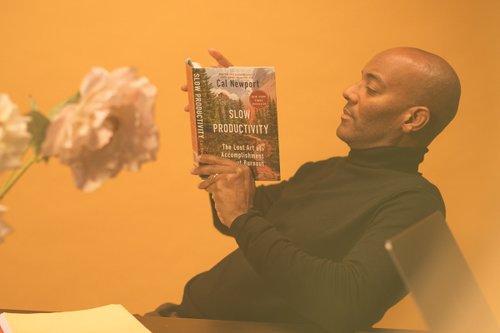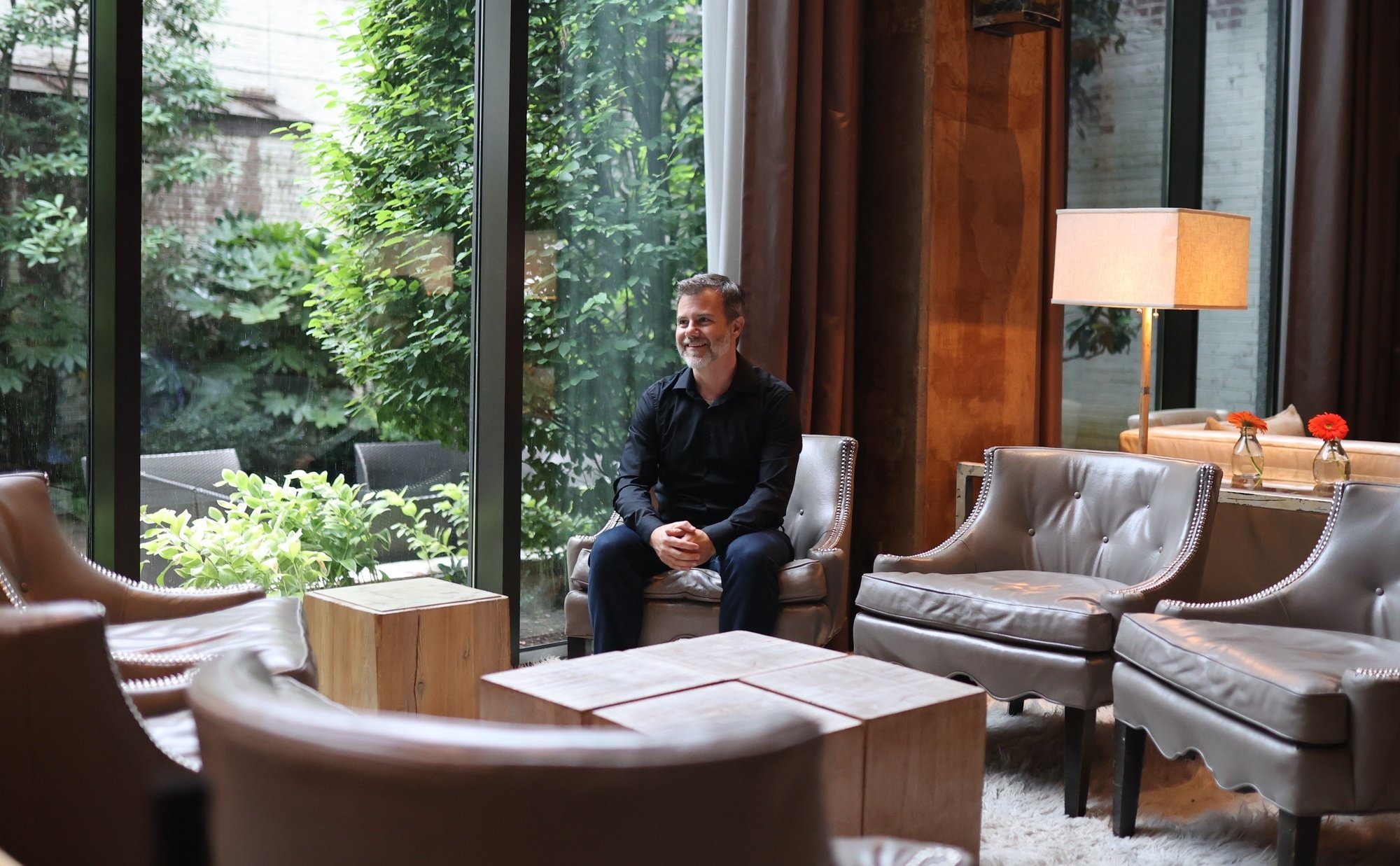Debunking the American Dream with Benjamin C. Waterhouse
Nov 13, 2024
7 mins


US Editor at Welcome to the Jungle
Historian Benjamin C. Waterhouse, a specialist in the culture and politics of business in modern America, brings his expertise to his latest book, One Day I’ll Work for Myself: The Dream and Delusion That Conquered America. At the University of North Carolina at Chapel Hill, where he teaches courses on American business history, the history of capitalism, and financial crises, Waterhouse has long explored the intersection of economic policy and American ideals.
In this new book, he offers a critical examination of the rise of self-employment and the gig economy, tracing how decades of economic challenges—stagnant wages, rising inequality, and shifting job markets—have fueled an idealized vision of entrepreneurship as the ultimate path to success. Yet, there is a darker side to this dream: Waterhouse sheds light on the instability, exploitation, and financial uncertainty that many gig workers face in a precarious “go-it-alone” economy.
The following article is adapted from an interview with Waterhouse, edited for length and clarity.
Major economic shifts that lead to alternative work
The gig economy didn’t just appear suddenly in the last 15 years. It’s the result of economic and cultural shifts that started decades ago. This shift wasn’t solely triggered by events like the Great Recession or the rise of smartphones, though both played roles. The gig economy emerged as a response to the growing insecurity in traditional work, which traces back to the 1970s and 1980s.
I trace the arc of the US economy over the past 80 years, beginning with the post-World War II boom. For about 30 years after the war, the US saw rapid economic growth and rising productivity, with gains distributed more equally. The middle class expanded, real wages increased, and income inequality declined, though this period still had significant exclusions—especially for women and people of color.
This period ended in the 1970s, ushering in five decades marked by rising income inequality. While wages for lower-income workers stagnated, incomes at the top surged, driven by macro-economic shifts like the rise of tech and financial services. Deregulation in finance, in particular, allowed wealth to concentrate at the top, creating jobs for a select few while leaving the broader workforce with less upward mobility.
“The gig economy didn’t just appear suddenly in the last 15 years. It’s the result of economic and cultural shifts that started decades ago.”
During this time, manufacturing jobs declined as service-sector jobs expanded. Service work spans both high-end financial services and lower-wage jobs in areas like retail, food, and healthcare, creating a bifurcated workforce. Union membership also dropped steeply, peaking in the 1950s and then falling as manufacturing gave way to service industries.
The business landscape shifted as well. The post-war era was dominated by large corporations in manufacturing and extraction, which provided stable, long-term jobs. By contrast, today’s largest employers, like Walmart, often offer limited career mobility and lower wages. The idea of lifetime employment at a single company largely faded, and self-employment or gig work became more common as people adapted to a fragmented economy.
The changing landscape of the American Dream
The American Dream has morphed in ways that few have acknowledged. Originally, it was a broad, evolving commentary—a way of expressing a collective vision of progress and upward mobility that touched nearly everyone. This Dream wasn’t just about making more money than one’s parents; it was about achieving a higher standard of living, a life with dignity, and some leisure. It was the hope that your children might enjoy a summer off instead of working in a mill, that you might own a modest home, and access a decent education. In the 1930s to 60s, the American Dream resonated as a practical, attainable goal for a wide swath of Americans.
The American Dream in the 1950s and 60s wasn’t about a “Jeffersonian yeoman farmer” ideal of doing things on your own. Some people followed that path, yes, but the promise of progress and a better future at that time lay in large institutions, which were seen as providing stable paths to a meaningful life. That’s what we’ve moved away from. And so I think the gig economy is the culmination of both technological advances and cultural and economic movements that have led people to believe—or perhaps rationalize—that, if you want to get ahead today, you have to do it by yourself.
“Now, when I hear people say that “the American Dream is to work for yourself,” I can’t help but notice just how much has changed. This is a very different Dream, and it’s one that perhaps fewer of us can truly attain.”
And so, by the 1980s and 90s, the definition began to shift. People increasingly equated the American Dream with owning a business, perhaps a small franchise or a tech startup launched from a garage. And yet, there’s a problem here. This version of the Dream, one that involves launching a business and achieving vast success, resembles a lottery more than a roadmap. It’s an aspiration accessible only to a small, fortunate few—nothing like the American Dream as it was once understood, as a concept open to everyone willing to work toward it. Now, when I hear people say that “the American Dream is to work for yourself,” I can’t help but notice just how much has changed. This is a very different Dream, and it’s one that perhaps fewer of us can truly attain.
Another issue here is the role of long-standing cultural assumptions and beliefs. We can trace a kind of progression over time by noting that Americans have a deeply ingrained sense of independence—very entrepreneurial, self-starting, risk-taking by nature. We can see this in writings by figures like Thomas Jefferson or early colonial and 19th-century leaders, even in the cowboy myth of the Wild West—pick any historical trope, and there’s something to that independent streak.
A consequence of social and political failure?
I see the rise of the gig economy and the push toward self-employment largely as a reflection of failure—a failure of many companies and of society as a whole to provide for workers. I’m critical of this ethic that says everyone should work for themselves because that’s the only way to get ahead. Now, I don’t judge anyone’s choice to pursue self-employment, but I do see the widespread promotion of this idea as a consequence of deeper social and political failures.
“I see the rise of the gig economy and the push toward self-employment largely as a reflection of failure—a failure of many companies and of society as a whole to provide for workers.”
That includes the gig economy. There are aspects of it that, as a consumer, I find beneficial. Taking an Uber, for example, is incredibly convenient, especially in areas without a lot of taxi options. But it’s also important to look beyond consumer convenience and think about the workers. The expectation that I should be able to pay very little for that ride, even if that means the driver is unfairly compensated, is something I would criticize. This dynamic mirrors other areas of our modern consumer culture, where we benefit from cheap goods but overlook the conditions making them affordable.
Historians have examined this trend—how prices for many things in the US have stayed low for decades, whether it’s gasoline, milk, or clothing. Mass production and economies of scale play a role, but so does the labor market. The fact that I can buy strawberries in January for a few dollars is because workers in Mexico or Southern California are harvesting them at a low wage. When we look at consumer products, including services like ridesharing, we have to ask: why is this so affordable?
The risk of exploitation
Now, coming back to the gig economy, I recognize that some people enjoy the flexibility it provides. Studies, and people I’ve spoken with, confirm that this type of work offers a certain freedom. But the risk of exploitation is real. It’s one thing if you’re driving for Uber for a few hours because you want extra cash after your main job or classes. But if you’re relying on it to make a living, and at the end of the day, you’re barely making minimum wage, then you’re being exploited.
“But if you’re relying on it to make a living, and at the end of the day, you’re barely making minimum wage, then you’re being exploited.”
I think the core issue lies with the use of independent contractor status. Within existing labor laws, I would support changes like a higher minimum wage, benefits, paid time off, and childcare—all under employment protections. But the big story in the gig economy is how much of this work falls outside of traditional labor laws because of independent contractor status, which has sparked lawsuits and voter referendums worldwide.
The nature of gig work raises complex questions about what “work” really is—are these workers truly independent? With platforms like Uber, DoorDash, or Mechanical Turk, it’s unclear. In my view, the main beneficiaries aren’t usually the workers; it’s the companies and the consumers paying for services at low prices.
Advice for the aspiring entrepreneur?
I’ve recently started attending conferences with business professors who teach entrepreneurship, and they get this question directly from students—either undergraduates or young MBAs just starting their careers. The most consistent advice they give is, “Go get a job for a few years and develop expertise in a specific area.”
At one conference, a management professor shared a story: a student approached him saying they wanted to start a tech startup, perhaps even disrupt the industry. The professor’s response was, “Go work for Facebook.” The student protested, “But I want to work for myself and launch a startup.” The professor replied, “I am teaching you how to do that. Go work for Facebook first.”
“Being an entrepreneur isn’t a job in itself; it’s about having a skill set in a specific field.”
What we know, statistically, is that successful new ventures are overwhelmingly started by people with significant industry experience. Being an entrepreneur isn’t a job in itself; it’s about having a skill set in a specific field. You can be a software engineer, a restaurateur, an advertiser, or a marketing professional—those are concrete roles with skills that you need to learn. The notion of “entrepreneur” as a job title on its own is mostly hype.
The future of gig work
Historians tend to joke that we’re not great at predicting the future since we’re trained to focus on the past. That said, I think it could go in multiple directions. On one hand, there’s now a greater awareness of the potential for exploitation and dashed hopes within the gig economy. But gig economy companies have been quite effective at resisting regulations aimed at enforcing independent contractor laws or establishing minimum wages.
The response varies widely depending on the region—some areas are pushing for stronger worker rights and protections and finding ways to apply these to gig work. But the challenge lies in the nature of labor movements, which have historically depended on solidarity among people who exchange their labor for wages. This structure makes unionizing or mobilizing independent gig workers difficult, as it doesn’t fit the traditional framework.
So, a lot will depend on the labor movement’s success in pushing back on these inequalities, and there have been some promising moves in recent years. Ideally, if someone chooses to drive for Uber or do gig work, it should be a choice, with the alternative being a stable job with better pay and conditions. That’s the world the labor movement is working to reclaim.
Photo: Ashley Johnson for Welcome to the Jungle
Follow Welcome to the Jungle on Facebook, LinkedIn, and Instagram and subscribe to our newsletter to get our latest articles every week!

More inspiration: Future of Work

The Bear: When professional passion turns toxic
Carmy's workplace trauma isn't unique...
Dec 31, 2024

The youth have spoken: South Korea’s push for a four-day workweek
Is this the end of Korean hustle culture?
Dec 26, 2024

Cal Newport's Slow Productivity: Redefining success in a hustle culture
Is slowing down the key to achieving more?
Dec 19, 2024

Wellbeing washing: Are workplace mental health apps doing more harm than good?
Workers are struggling with mental health. Are employers approaching it the right way?
Dec 19, 2024

Dark side of DINKs: Working as a childfree adult
Having children comes with challenges. So does choosing not to.
Dec 11, 2024
Inside the jungle: The HR newsletter
Studies, events, expert analysis, and solutions—every two weeks in your inbox



